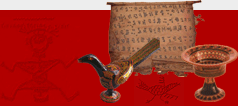|
彝族毕摩与纳西族东巴的比较研究
A Comparison of the Yi Bimo and the Naxi Domba
王 薇 张泽洪 Wang Wei & Zhang Zehong
四川大学道教与宗教文化研究所
【摘要】彝族与纳西族在其民族起源与发展上有着共同的历史源头和文化联系,这就使同样从事本民族传统宗教职业的彝族毕摩与纳西族东巴的比较研究成为了可能。本文将从毕摩与东巴的历史源流、主要职能与特点及所使用法器等诸方面对二者进行比较,并探究二者同异背后的历史与文化动因。最后本文试从彝族与纳西族历史源流的角度分析二者比较的必要性与重要意义。
关键词: 彝族 毕摩 纳西族 东巴 传统宗教
Abstract
The ethnic origin and development of Yi group and Naxi
group are historically and culturally related, which renders
possible the comparative study of their respective traditional
religions specialists, the Bi-mo of Yi group and the Dongba
of Naxi group. This thesis aims to compare the two in the
respect of historical origin, major role in social life,
and instruments of religions ritual, then examine the historical
and cultural reasons behind the similarities as well as
the transitions. In the end, this thesis will try to give
an analysis as why this comparative study is necessary and
important, from a historical point of view.
Keywords: Yi group, Bimo, Naxi group, Domba, traditional
religion
作者简介:
王薇,四川成都人,1980年8月生。2003年获四川师范大学文学学士学位,现为四川大学宗教学研究所硕士研究生,研究方向为中国西南少数民族宗教。
张泽洪,四川三台人,1955年9月生。先后获武汉大学历史学硕士、四川大学哲学博士学位。1987年分配至四川大学宗教学研究所工作。现为四川大学宗教学研究所教授、博士生导师(教育部人文社会科学重点研究基地四川大学道教与宗教文化研究所教授);教育部人文社会科学重点研究基地四川大学中国俗文化研究所兼职教授;西藏大学兼职教授;2002年度遴选为四川省学术带头人。中国民族学会理事、中国中外关系史学会理事、中国宗教学会会员、中国民族史学会会员。主要研究中国少数民族宗教、中国道教。学术著作有《道教神仙信仰与祭祀仪式》、《道教斋醮符咒仪式》、《道教斋醮科仪研究》等,参加《中国道教》、《道教大辞典》、《道教仪礼》、《四川省志·民族志》等十五种著作的撰稿,专著及撰稿著述共计228万字。在国内外发表学术论文145篇,其中核心刊物70篇。人大复印资料《宗教》、《民族研究》转载12篇,《高等学校文科学报文摘》转摘1篇。在宗教学、民族学、历史学权威刊物《世界宗教研究》、《民族研究》、《中国史研究》发表《许逊与吴猛》、《城隍神及其信仰》、《“巴氐”辨疑》、《中国南方少数民族与道教关系初探》、《瑶族社会中道教文化的传播与衍变——以广西十万大山瑶族度戒为例》、《净明道在江南的传播及其影响——以道派关系史为中心》等论文。在台湾国际汉学著名刊物《汉学研究》发表《论道教祭祀仪式的青词》。《道教斋醮符咒仪式》获2000年度“卿氏学术基金会道教文化优秀著作奖”,获四川省人民政府哲学社会科学优秀成果三等奖(2001年度)。《道教神仙信仰与祭祀仪式》获第十一届四川省人民政府哲学社会科学优秀成果三等奖。译著《坐禅如斯》。张泽洪学术研究领域广泛,成果涉及宗教学的道教研究,民族学的中国少数民族宗教文化研究。目前在中国道教史的净明道研究,早期正一道研究,灵宝派研究,道教民间俗神信仰研究,道教斋醮仪式的历史及科仪思想研究,西南少数民族与道教关系研究,西南少数民族宗教与道教祭祀仪式比较研究,四川回族伊斯兰教史研究等领域,都有多篇有功力的学术论文,是近年国内最具有创发力的学者之一。
About the Author:
Wang Wei, born in Chengdu, Sichuan province in August,1980.
I was granted B.L. degree with honor from Sichuan Normal
University in 2003, currently assiduously studying for the
master's degree in Institute of Religious Studies, Sichuan
University, and majoring in the ethnic groups’ religions
in southwestern China.
Zhang Zehong, The religions of the ethnic groups in southwest
of China, The Taoism of China, The achievements concern
with the study of Taoism in Religions, the study of religious
culture of the ethnic groups of southwest of China in ethnology..
And now, I’m studying the Jing Ming (the crystal purity
) Daoist Sect , The early Zheng Yi (the Right One) Daoist
Sect and Ling Bao (the efficacious treasure) Daoist Sect.
in the history of Taoism., and the folk faith of the spirits
in Taoism, the research of the history of ZaiJiao (Fasting
and Sacrificing Ceremony) Rite and the concepts displayed
in those rites. I also work on the study of the relations
between Daoism and the ethnic groups in southwest of China,
the comparative study of the religions of the ethnic groups
to the sacrificing rites of Daoism, and the history of Islam
of Hui people in Sichuan province., etc .Many penetrating
academic papers have been published. I’m one of the creative
scholars in the country in recent years. My academic works
are Spirits Beliefs and the Sacrificing Rites of Taoism,
The Incantations of Fasting and Sacrificing Rites of Taoism,
I wrote some articles for The Daoism of China, The Dictionary
of Daoism, The Rites of Daoism, The Annals of ethnic groups
of Sichuan Province, etc. All of my books and papers have
228,000,000 Chinese characters. I have one hundred and fourteen
published papers, among them, fifty-seven were published
in the core journals, six of them were in some authoritative
journals, such as The Journal of Religions, The Journal
of Ethnology and The Journal of History, etc. The book of
The Rites of Fasting and Sacrificing and Incantations of
Taoism attained the third reward from the government of
Sichuan province, as one of the elegant achievements of
philosophic and social science.
|





